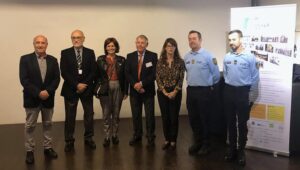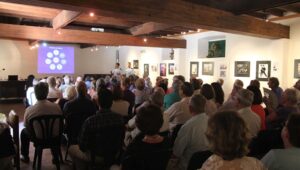By David Thomas
Recently I received an overseas call from a person who owns a property just to the east of Loulé and was about to return here to deal with the consequences of a theft at his property. This had been reported to the GNR. On visiting the property, it was clear to me that the thieves had been selective – only steal items made of copper and aluminium.
What they had stolen were the solar panels which had been protected by a two-metre high fence in the garden, connecting water pipes and the shutters from the house itself. In the process of removing the solar panels, the glass had been broken, probably before removal, to make them lighter to transport.
A problem throughout Europe
There is little doubt that metal theft is having a devastating impact on businesses, communities and individuals, not only in Portugal but throughout Europe
This includes the loss of key services such as telecommunications and power, disruption of rail networks and the desecration of religious buildings and memorials.
In most cases, the economic damage caused by metal theft far exceeds the value of the metal concerned.In the UK for instance, there are about 1,000 metal thefts per week which is estimated costs the national economy £770 million (approximately €950 million) per year. In addition, UK insurers reportedly pay out £1 million (approximately €1.25 million) a week to victims of metal theft.
Authorities in the UK say the “serious” international criminal syndicates are behind attacks on the country’s historic buildings, railways and national infrastructure. Intelligence suggests gangs from Africa and China are stealing valuable metal to “finance and fund organised crime” while causing “serious harm” in Britain.
Police sources say evidence has, for the first time, provided “proof of how the metal theft epidemic has now become a highly organised international operation”.
The Greek National Railway Company (ΟΣΕ) suffered €12 million of damage in two years due to thieves stealing metal from the railways. In the Czech Republic, an organised crime group stole a 10 tonne bridge and 650 feet of railway track from the south west town of Slavkov.
However, in some cases metal theft causes more than just financial loss. Cemeteries in Italy are attacked by thieves stealing commemorative copper vases. In the UK, plaques and memorials dedicated to war victims and family members are being stolen and sold as scrap metal. These thefts are extremely distressing to the victims and have a major social impact.
In Belgium, a man died after disturbing a high voltage transformer whilst attempting to steal cable from a railway.
Metal thieves have also lost their lives in Italy, Portugal and the UK. I recall one instance in Portugal last year when two men were electrocuted attempting to remove a power cable.
Situation in Portugal
About 75% of metal theft in Portugal is copper, followed by 12% iron, with utilities, rail networks, communications and agriculture being the main areas affected.
It is understood from one source that in Spain organised crime groups are using illegal scrap metal dealers to export stolen metal to Northern Africa and Portugal. According to the GNR, it was estimated that metal theft in 2011 cost Portugal €43 million, in particular energy and telecommunications companies.
GNR stated that in the first eight months of 2011 almost 90 tonnes of copper was stolen amounting to €19.3 million. This far exceeds the value of iron thefts for the same period which was €1.8 million for 304 tonnes.
During the first six months of 2012, the GNR seized close to 16 tonnes of copper throughout Portugal, representing an enormous 515% increase on what was seized during the same period of 2011, when 2,600 kilos of copper were apprehended.
From January to June 2012, 767 cases of copper theft had been registered in Lisbon (421 fewer than in 2011); 1,135 incidents were reported in Porto (up 389); in Aveiro there were 782 thefts (373 more than in 2011); Leiria GNR recorded 793 cases (361 more than in the first six months of 2011); Coimbra registered 717 copper thefts (up 331 on 2011) and in Faro, 827 incidents (an increase of 284 compared to 2011).
Enforcement action
In 2011 the number of metal thefts almost tripled from 4,946 in 2010 to 12,624. The number of arrests by GNR in 2011 also increased. In 2010 225 arrests were made and in 2011 this doubled to 503. Up until June 2012 the police had arrested 269 suspects.
Since the start of 2013, there have been a number of arrests: in Pombal two men were detained for the theft of copper cables from a telecommunications company, in Valongo five persons were arrested for theft of copper, in Mafra seven persons were arrested for stealing metal from a shipyard and in Vila Nova de Gaia two persons were arrested for theft of manhole covers.
On January 16 and 17 this year, the GNR conducted Operation Verdete resulting in the arrest of one individual for theft of metal including 1,439 kilos of copper, 34 gas cylinders and three generators as well as other items.
A total of 13 waste management/scrap yard facilities were closed in breach of licensing conditions including one for theft. Five other crimes involving theft of metal were also detected.
Prevention
From information available to Safe Communities Algarve, the range of metal items stolen include garden tools, water pumps from swimming pool pump houses, solar panels, air-conditioning units, shutters, power and telecommunications cable and copper piping.
In one instance I know of water taps were removed from the wall of a house allowing the water to flood over the garden – I am sure the water bill well exceeded the cost of the taps!
Police at periodic intervals mount operations at scrap yards to search for stolen metal items and, as a result of this, a number of scrap yards have been closed.
There is now legislation in place which makes it more difficult for criminals to dispose of stolen items in this way.
Clearly such crime is difficult to prevent and both the police and the communications industry are looking at ways to reduce the risk of this criminal activity.
||Metal theft – reducing the risk
■ Lock all garden tools away when not in use.
■ Ensure that any outbuildings used for storage and water pump rooms are fitted with good quality doors and locks.
■ Close and lock aluminium shutters when the property is unoccupied to make it more difficult to remove these. Security locks for shutters are available locally.
■ Keep serial numbers of metal objects and tools where they are marked, so in the event of theft this can be given to police. They may subsequently turn up in a scrap yard.
■ With farm yard machinery ensure that this is firmly secured by a lock and chain to something difficult to remove quickly like a large tree.
■ Electric metal gate arms should be bolted to gate posts and the top of bolts welded to prevent their removal by thieves.
■ When driving farmyard machinery like tractors in the countryside try and avoid these being left out of sight.
■ For more valuable metal items that have to kept outdoors, consider the use of outdoor alarm detectors and/or CCTV.
||features@algarveresident.com
David Thomas is a former Assistant Commissioner of the Hong Kong Police, consultant to INTERPOL and the United Nations Office on Drugs and Crime. In October 2011 he formed Safe Communities Algarve an on-line platform here in the Algarve to help the authorities and the community prevent crime. 913 045 093


















